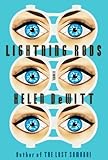 Like her contemporaries Jeffrey Eugenides and Jonathan Franzen, Helen DeWitt went much of the last decade without publishing a novel, and in a just world, her new book, Lightning Rods, would be greeted with the same frenzy of publicity that attended Freedom last year, or The Marriage Plot just this month. I’m picturing editors from glossy magazines knife-fighting in alleys for a chance to feature DeWitt on the cover… Times Square billboards of DeWitt traversing some rustic byway, vest saucily aflap… A giant inflatable Helen DeWitt looming over the Macy’s Thanksgiving Day parade, nodding down at rapt throngs of skinny-jeaned teens…
Like her contemporaries Jeffrey Eugenides and Jonathan Franzen, Helen DeWitt went much of the last decade without publishing a novel, and in a just world, her new book, Lightning Rods, would be greeted with the same frenzy of publicity that attended Freedom last year, or The Marriage Plot just this month. I’m picturing editors from glossy magazines knife-fighting in alleys for a chance to feature DeWitt on the cover… Times Square billboards of DeWitt traversing some rustic byway, vest saucily aflap… A giant inflatable Helen DeWitt looming over the Macy’s Thanksgiving Day parade, nodding down at rapt throngs of skinny-jeaned teens…
Then again, a world more hospitable to minds like DeWitt’s would likely deprive her of the frustrations that give her writing its unique moral intensity. Her first novel, The Last Samurai (2000), was among other things a look at the fate of the imagination in a fin-de-siecle culture consecrated to the superficial, the gaseous, and the ephemeral. Your Name Here (2007), her unpublished and more or less unsummarizable follow-up, hinges on an exiled writer named “Helen DeWitt” and her struggles to wrest art from the lunacy of post-9/11 life.
 At first blush, Lightning Rods looks like a departure. The Last Samurai fits into an erudite subgenre called the “anatomy” – the novel that wants to swallow the whole world. (This may be part of what the critic Marco Roth had in mind when he called DeWitt “Twenty-First-Century America’s finest Seventeenth-Century novelist.”) Lightning Rods, by contrast, is a tapered, tailored 280 pages. It confines itself largely to the willfully beige environs of the contemporary American office park. Moreover, it is a comedy. By this I mean not so much “a book with jokes in it” as that rarer thing, the laughing-so-hard-other-people-on-the-subway-are-starting-to-wonder-if-you-require-psychiatric-attention book. But fear not, Samurai lovers; DeWitt’s moral vision remains as sharp as ever. Which is to say, Lightning Rods belongs to another venerable literary tradition: the satire.
At first blush, Lightning Rods looks like a departure. The Last Samurai fits into an erudite subgenre called the “anatomy” – the novel that wants to swallow the whole world. (This may be part of what the critic Marco Roth had in mind when he called DeWitt “Twenty-First-Century America’s finest Seventeenth-Century novelist.”) Lightning Rods, by contrast, is a tapered, tailored 280 pages. It confines itself largely to the willfully beige environs of the contemporary American office park. Moreover, it is a comedy. By this I mean not so much “a book with jokes in it” as that rarer thing, the laughing-so-hard-other-people-on-the-subway-are-starting-to-wonder-if-you-require-psychiatric-attention book. But fear not, Samurai lovers; DeWitt’s moral vision remains as sharp as ever. Which is to say, Lightning Rods belongs to another venerable literary tradition: the satire.
Satire’s a lot like haiku, or Marxism: there’s the loose version and there’s the strict version. In recent decades, American writers, being American writers, have preferred the former. You pick a subject, usually institutional (politics, the university, the news media), and you attack it with as many comic exaggerations and caustic jokes as possible. This technique has yielded some good novels, but it’s formally a fair piece from the canonical satire of, say, Jonathan Swift. This latter is an art of constraint, rather than of license. Its genius is to invent a single premise – the proposal of “A Modest Proposal,” the catch of Catch-22 – and to follow it without flinching to the most absurd ends. The excitement comes from watching the writer chain himself to the implacable machinery of his own logic. And as DeWitt’s idiosyncratic intellect has always gravitated toward the gap between messy reality and the logical Ideal, it’s no surprise to find her choosing the narrower path, and succeeding brilliantly.
The protagonist of Lightning Rods is a guy named Joe, whose surname, never given, might as well be Schmoe. He’s a particular sort of American Everyguy – a hapless door-to-door salesman who at age 33 has sacrificed the possibility of emotional or spiritual fulfillment on the altar of the most conventional sort of material success. Or, more accurately, has lost any ability to distinguish between the two. By day, Joe travels around failing to sell encyclopedias, and later vacuum cleaners. By night, he concocts baroque masturbation fantasies that fail to assuage his sense of failure. He should be out selling right now, he thinks. He should be a different and better person. “Which just goes to show,” DeWitt writes,
how blinkered we can be by our preconceptions. Because little though he knew it, it was the hours he spent trying to sell vacuum cleaners that were the waste of time, something he would remember with shame and self-loathing for the rest of his life. His well-meant efforts to develop an efficient masturbatory program, likewise, were completely misconceived. What he didn’t realize is that a genius is different from other people. A genius doesn’t waste time like other people. Even when he looks like he is wasting time he may in fact be making the most productive possible use of the time.
Joe’s particular insight is to take his favorite masturbation fantasy and not only bring it to life but monetize it. I wouldn’t want to spoil for you the pleasure of discovering that fantasy yourself. Nor would I want to give away exactly how – with the help of a future Supreme Court justice, an adjustable-height toilet, several pairs of PVC undergarments, and a dwarf named Ian – Joe manages to realize it. Suffice it to say, the genius is in the details. And, speaking of details, look again at the passage above. Notice the double entendre of “a genius doesn’t waste time like other people,” and the sly redundancy (i.e., time-waste) of the sentence that follows. Joe’s target demographic – office worker – gives DeWitt a chance to luxuriate in the eloquent dumbness of the corporate idiom. Her delight in nuggets like “orientated” and “product feature” and “bifunctionality” (and, come to think of it, “corporate culture”) is evident in every deceptively artless sentence.
She never condescends to her characters, however; like George Saunders, that other poet laureate of the management handbook, she’s too damn curious about the way they think. “In an ideal world,” Joe muses, in another typical moment,
he would obviously have wanted to spend more time making sure no one was doing anything she didn’t feel comfortable with. Unfortunately our world is very far from ideal, sustainable client development was absolutely vital to the success of the business, and it was up to him to single-handedly pursue that goal for all their sakes.
We are too close to Joe’s thoughts here to comfortably condemn them, or even to be sure where they end and DeWitt’s begin. “Unfortunately our world is very far from ideal”: is that a banality contaminated by truth, or a truth contaminated by banality? And make no mistake about it: Joe is after truth, to exactly the extent that he’s able to frame the concept. He is a strangely moving figure, a devoted pilgrim in a world whose prophetic tradition consists of Dale Carnegie, George Gilder, and Napoleon Hill.
 According to the publisher’s flap copy, Lightning Rods “take[s] on the complex issues surrounding sexual tension in the workplace.” To my ear, this betrays a questionable sense of salesmanship. I keep hearing a snatch from an old Monty Python routine: “Tonight on Who Cares: Sexual Tension in the Workplace.” (I would have gone with Remainder meets House of Holes, by way of Then We Came to the End.) More importantly, though, it’s a classic case of the slipperiness of satire. Lightning Rods is no more “about” sexual tension in the workplace than A Tale of a Tub is about the tub. But if Joe’s “Lightning Rods” are the vehicle, what is the tenor? What, exactly, is being skewered? By the end of the book, the answer, wonderfully, seems to be “everything”: bureaucracy, sexual politics, the objectification of the female body, the sanctification of same, political correctness, political incorrectness, etiquette, boorishness, ambition, laziness, late capitalism, and even logic itself. DeWitt brings to satire what Roberto Bolaño’s 2666 brought to the detective story: purity of means, ineffability of ends. This is not to say that Lightning Rods shares that novel’s epic sweep. It is, by design, a minor work. (DeWitt says she began writing it, and several other books, in 1998, “to pave the way for” The Last Samurai) But it so emphatically aces the tasks it sets for itself, and delivers such a jolt of pleasure along the way, that it reminds me of just how major a minor work can be. I wish the other leading American novelists would produce more books in this vein. Come to think of it, I wish Helen DeWitt would, too. At any rate, as one of her endearingly flummoxed characters might say, I literally cannot wait to see what she does next.
According to the publisher’s flap copy, Lightning Rods “take[s] on the complex issues surrounding sexual tension in the workplace.” To my ear, this betrays a questionable sense of salesmanship. I keep hearing a snatch from an old Monty Python routine: “Tonight on Who Cares: Sexual Tension in the Workplace.” (I would have gone with Remainder meets House of Holes, by way of Then We Came to the End.) More importantly, though, it’s a classic case of the slipperiness of satire. Lightning Rods is no more “about” sexual tension in the workplace than A Tale of a Tub is about the tub. But if Joe’s “Lightning Rods” are the vehicle, what is the tenor? What, exactly, is being skewered? By the end of the book, the answer, wonderfully, seems to be “everything”: bureaucracy, sexual politics, the objectification of the female body, the sanctification of same, political correctness, political incorrectness, etiquette, boorishness, ambition, laziness, late capitalism, and even logic itself. DeWitt brings to satire what Roberto Bolaño’s 2666 brought to the detective story: purity of means, ineffability of ends. This is not to say that Lightning Rods shares that novel’s epic sweep. It is, by design, a minor work. (DeWitt says she began writing it, and several other books, in 1998, “to pave the way for” The Last Samurai) But it so emphatically aces the tasks it sets for itself, and delivers such a jolt of pleasure along the way, that it reminds me of just how major a minor work can be. I wish the other leading American novelists would produce more books in this vein. Come to think of it, I wish Helen DeWitt would, too. At any rate, as one of her endearingly flummoxed characters might say, I literally cannot wait to see what she does next.
Image credit: New Directions








